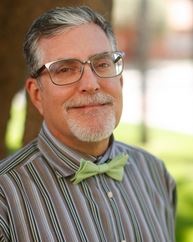Faces of NNLM Region 4: Jerry Perry
Posted in: #CC/Academic List, #Health Interest List, #Health Sciences List, #Public/K-12 List, All Members
 We will be shining a light on Jerry Perry, Interim Associate Dean for the University of Arizona Libraries. Below is an interview with Mr. Perry about his experience being a medical librarian.
We will be shining a light on Jerry Perry, Interim Associate Dean for the University of Arizona Libraries. Below is an interview with Mr. Perry about his experience being a medical librarian.
Can you give us the elevator-speech rundown of your medical librarian career?
-
-
- I had a work-study job in the general academic library at the university where I was enrolled to study journalism. I graduated during a recession and needed a steady income between writing gigs, so I leveraged my library experience and landed a job at a hospital library as the assistant – it was a two-person operation. I loved it! I had an inspirational boss/mentor, and my employer paid for me to get a master’s degree in library science. From there I’ve had a succession of jobs in academic health sciences libraries, though I transitioned about six years ago to work in a position where I have responsibilities for both health and general library operations.
What are your research interests or top work activities?
- As Associate Dean, I am a member of the senior leadership team for the libraries (as a system) at my university. The research and learning librarians for both the health and general academic libraries all report to me through their department heads. I also am involved in assessment and strategic planning efforts. In the past my research interests included health information literacy for members of the LGBTQ+ community especially around HIV/AIDS, instruction in evidence-based healthcare, and the intersection of librarianship with informatics. Recently I’ve been involved in the Mobilizing Computable Biomedical Knowledge effort with an emphasis on the role of librarians in making biomedical knowledge, in the form of code and algorithms, findable, accessible, interoperable, and reusable (FAIR). I’m especially interested in amplifying the diversity, equity, inclusion, and anti-racism aspects of FAIR computable biomedical knowledge.
What prompted you to become a medical librarian?
- Money to go clubbing? As noted in my elevator speech, I graduated during a difficult economic period and was struggling to make enough money to pay my student loans, let alone engage in life as a twenty-something who was into punk rock, reggae, and what we called new wave music. In some ways it was happenstance, but things turned out well!
What is your favorite librarian tool?
- I have been in an administrative role for so long, I really do very little actual librarianship. But I’d say it’s a tie between PubMed and MedlinePlus since I use both quite frequently.
What do you think are the most important challenges that medical librarians face?
- Precarity of funding for libraries;
- Longstanding failure to recruit and retain faculty and staff from traditionally underserved, underrepresented, minoritized, and marginalized communities;
- The “forever work” of making the value proposition case for libraries. It’s not just because of the Internet, Google, and Twitter. How people work – how they think and do – is changing and we need to be always attuned to that need to evolve. Folks need to read Bob Braude’s MLA Doe Lecture, “On the Origin of a Species: Evolution of Health Sciences Librarianship.” Words to live by in the profession.
Please tell us about an interaction with a library user that gave you a lot of satisfaction.
- The most satisfying work that I ever did in partnership with a library user (or users) was the instructional work I used to do on behalf of the Arizona Health Information Network (AZHIN) via the Arizona Telemedicine Program’s statewide networks. I used to teach caregivers situated in small rural clinics, in the prison system, within the Indian Health Service, in downtown Phoenix, in clinics near the border or up in the White Mountains – all over the state. It was great fun to use the technology to teach folks how to use PubMed and many commercial resources licensed by AZHIN – and this was all many, many, years before Zoom!
Yamila M. El-Khayat, MA serves as Communications and Citizen Science Specialist at NNLM (Network of the National Library of Medicine) Region 4. She has a passion for health information and working with all communities in particular traditionally marginalized communities. Yamilais a medical librarian at the University of Arizona. In working as a Librarian, she has been determined to increase health literacy to better serve the needs of the Latino and Native American populations, improving access to information related to the health of Native American, Hispanic, Border, Evidence-based, intercultural, bilingual, and culturally appropriate. She has experience training information for clinicians, students, and community members, including health promoters/ “Promotores de Salud”

 We will be shining a light on Jerry Perry, Interim Associate Dean for the University of Arizona Libraries. Below is an interview with Mr. Perry about his experience being a medical librarian.
We will be shining a light on Jerry Perry, Interim Associate Dean for the University of Arizona Libraries. Below is an interview with Mr. Perry about his experience being a medical librarian.